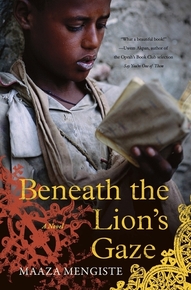
Above: Maaza Mengiste was born in Addis Ababa, Ethiopia, and
graduated with an MFA in Creative Writing from NYU. A recent
Pushcart Prize nominee, she was named “New Literary Idol” by
New York Magazine. (Photo © Miriam Berkley)
The New York Times
By LORRAINE ADAMS
Published: December 31, 2009
Maaza Mengiste’s first novel, “Beneath the Lion’s Gaze,” opens in 1974 during the last days of Selassie’s six-decade rule. A young man lies on an operating table with a bullet in his back. A student protester, he is part of a popular tide that, along with a military uprising, will soon sweep Selassie from power. The attending physician wears a watch the emperor gave him upon his graduation from an English medical school. The doctor sees his patient — and his own younger son, who is also a revolutionary college student — as rash and foolish. His older son, a 32-year-old history professor with a small daughter and a wife, shares his father’s contempt for the burning and looting, the increasingly violent rallies. Read more.
Update (Jan 6, 2009)
*AUTHOR’S NOTE: The January 3, 2010 edition of the New York Times Sunday Book Review has a review by Lorraine Adams that states Beneath the Lion’s Gaze depicts Emperor Haile Selassie dying as a result of being shot, and the killer is the doctor’s (Hailu’s) neighbor. This is incorrect. Beneath the Lion’s Gaze depicts the emperor dying at the hands of another fictional character through other means.
An epic tale of a father and two sons, of betrayals and loyalties, of a family unraveling in the wake of Ethiopia’s revolution.
This memorable heartbreaking story opens in Addis Ababa, Ethiopia, 1974, on the eve of a revolution. Yonas kneels in his mother’s prayer room, pleading to his god for an end to the violence that has wracked his family and country. His father, Hailu, a prominent doctor, has been ordered to report to jail after helping a victim of state-sanctioned torture to die. And Dawit, Hailu’s youngest son, has joined an underground resistance movement—a choice that will lead to more upheaval and bloodshed across a ravaged Ethiopia.
Beneath the Lion’s Gaze tells a gripping story of family, of the bonds of love and friendship set in a time and place that has rarely been explored in fiction before. It is a story about the lengths human beings will go in pursuit of freedom and the human price of a national revolution. Emotionally gripping, poetic and indelibly tragic, Beneath the Lion’s Gaze is a transcendent and powerful debut.
Publication: W.W. Norton, January 11, 2010



























The most amazing writer I know! She will take Ethiopian literature to another level. This book was amazing and captivating, proud to have her represent me and my country in the literary world.
It is wonderful and refreshing to finally see a book that writes our story. The revolution, and its impact on the lives of so many of us is important for the world to read. Bravo, Maaza!
However, I am concerned about the accuracy of Ms. Adams’ book review. (I received my copy of Beneath the Lion’s Gaze two weeks ago and read it.)
Whatever one’s feelings about Haile Selassie, to only cite Ryszard Kapuscinski’s account, is unfortunately to cite the most “glorified” account of Haile Selassie’s life but not the most accurate.
Second, if Ms. Adams had more thoroughly read Maaza Mengiste’s book, she would have known that in the scene depicting the Emperor’s death, Haile Selassie is not shot, nor is it at the hands of the particular character she mentions.
Third, in Ms. Adams’ review, she ends by calling the novel “Under the Lion’s Gaze.” Not only does this show her reluctance to pay attention to the the title of Maaza Mengiste’s novel, but it is also a reflection of her lack of close reading of this impressive first novel.
Congratulations, Maaza. As soon as I found out about the new novel, I rushed to the bookstore to get a copy. Unfortunately, the bookstore has not received its orders yet and I have to wait until next week to get my copy. This is a wonderful way to begin the Gregorian New Year. It is this kind of achievement that empowers us all. As the saying goes, let your pen never runs out of ink. That is, keep on writing!
Afework,
Your reading of the New York Times review is partially off the rails, but not completely. As book reviews go, this was a very positive review indeed. Yes, it is unfortunate that Ms Adams did get the name of the book wrong in her closing, but she also said the book “is an important novel, rich in compassion for its anguished characters.”
“It is brave of so young a novelist to attempt to tell not only Selassie’s story but also that of the Derg. Dinaw Mengestu, who left during his country’s “red terror” at the age of 2, glancingly addresses it from the perspective of an Ethiopian immigrant in his accomplished first novel, “The Beautiful Things That Heaven Bears.” And Nega Mezlekia’s memoir, “Notes From the Hyena’s Belly,” vividly describes his days as a guerrilla soldier in the Derg era. But neither has Mengiste’s tenacity. For all its beginner’s flaws, “Under the Lion’s Gaze” is an important novel, rich in compassion for its anguished characters.”
As a side bar: How did you mange to get the book before the public? The book will not be released until next week. mmmm
Good day!
Dear Readers,
We have updated this post with a note from Maaza Mengiste, the author of “Beneath the Lion’s Gaze.
*AUTHOR’S NOTE: The January 3, 2010 edition of The New York Times Sunday Book Review has a review by Lorraine Adams that states Beneath the Lion’s Gaze depicts Emperor Haile Selassie dying as a result of being shot, and the killer is the doctor’s (Hailu’s) neighbor. This is incorrect. Beneath the Lion’s Gaze depicts the emperor dying at the hands of another fictional character through other means.
***
I am so excited about this book. I cannot wait to get my hands on it. I’ve searched everywhere I can think on the web to find but am wondering if I need to make a special trip to NYC to get my own copy. Congratulations! When the movie comes out I will definitely be first in line.
good job, you’re the best…..,
Wanda Olugbala,
You can buy it at Amazon.com or other book sellers on line. I am waiting for mine from amazon.
Congratulations!
The New York Times writer did a disservice to the author of This book. The disrespect of the Emperor, the Godfather of African Unity, by the NYT writer should be disdained by all intelligent people. The NYT writer wrote that The Emperor went into exile and lived a quiet life. The writer failed to mention that the Emperor delivered perhaps the most prophetic and important speech in modern history when he addressed the League of Nations in 1936 during his exile. This speech prophesized World War II, defended the cause of Ethiopia and all small nations against larger aggressors, and gave the formula to preserve or bring about world peace & security.
I have never visited Ethiopia. But I have a great interest in the country and its people and its history; I received this book as a gift from someone who knows of my interest. The book starts out very slowly, and in the first chapters I was unsure if I was going to stick with it, but it was my compelling interest in Ethiopia that kept me. The payoff was great – at a certain point I could no longer put it down, and I finished it quite quickly. I loved the view of Derg-era Ethiopia from deep inside the day-to-day lives and concerns of one family – this was a beautiful way to explore the meaning of that history for the Ethiopians who experienced it. I will look for more from Maaza Mengiste.
For all the hue and cry and even if Meaza Mengiste writes quite well I still say she has taken so much liberty with the reality that her fiction falls flat for those who lived that period. Her lack of knowledge of the Ethiopian reality comes out through and through making her main characters cardboard imitations. She should have researched more as she left Ethiopia a long time ago and cut down on the flowery images (does a hyena snort and how loud?) and read those elders of hers who wrote so fascinatingly on that period.I can see how her book can interest foreigners by=ut as an Ethiopian I found it lacking insubstance and magnetism.